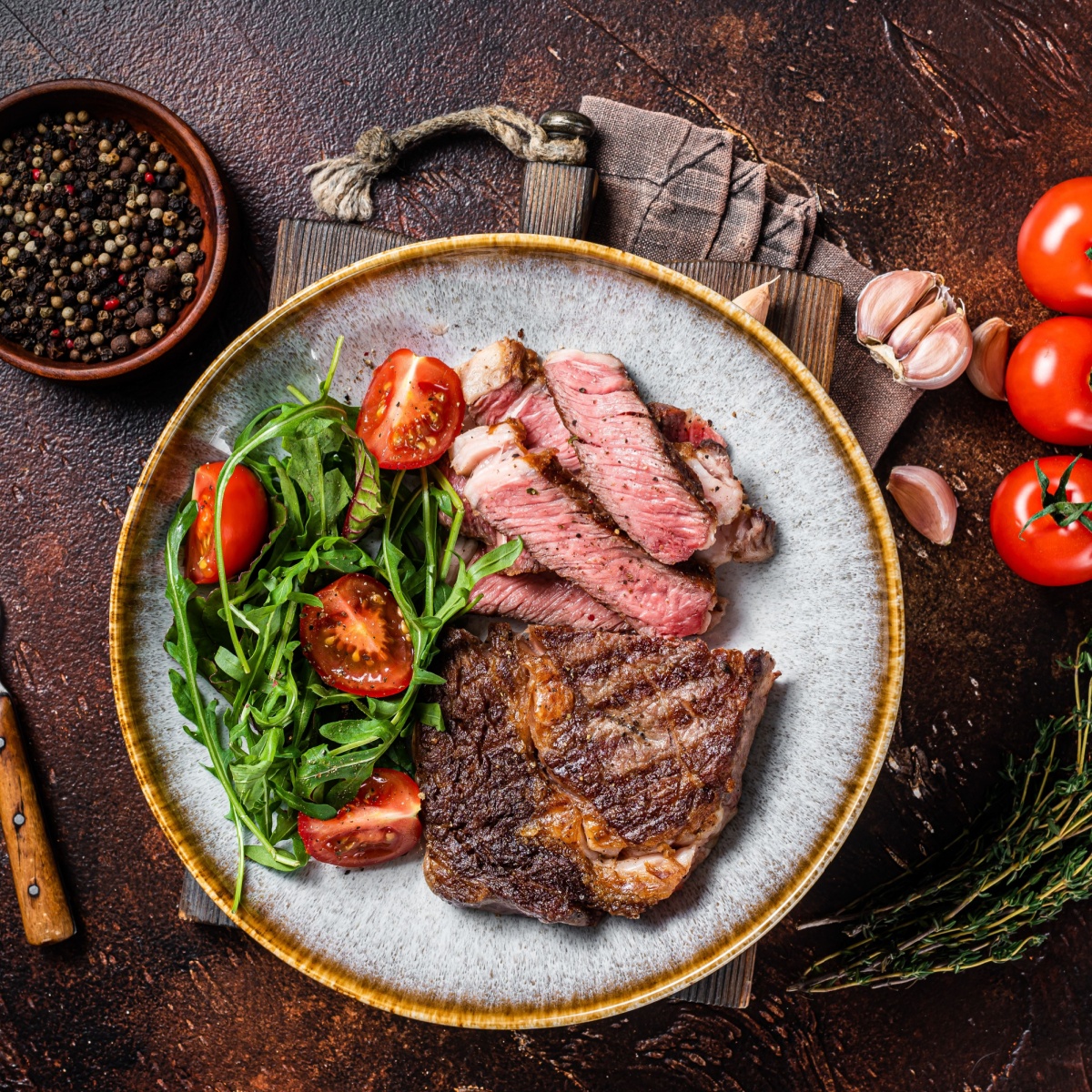
1. Prime rib
Prime ribs are typically high in saturated fats, which, when consumed in large amounts, can raise LDL (bad) cholesterol levels in the blood. This can contribute to the buildup of plaque in the arteries.
"Prime rib is one of the fattiest cuts of red meat, making it high in both saturated fat and cholesterol," Andrews warns. "If you want steak, go for a lean filet mignon, but skip the bacon wrap," she suggests.
2. Bacon
Just like prime ribs, dinner foods containing bacon, such as carbonara pasta, bacon and potato soup, and many others, are rich in saturated fat, which can lead to a rise in LDL (bad) cholesterol levels in the blood. Bacon is often cured and processed with salt, leading to a high sodium content. Excessive sodium intake can contribute to high blood pressure, which is a risk factor for heart disease and stroke.
"Full of saturated fat and sodium, beef or pork bacon is one of the worst offenders for clogging your arteries," Andrews warns. "Saturated fat makes your liver produce more cholesterol, which can lead to atherosclerosis (hardening of arteries)."
3. Mozzarella sticks
Mozzarella sticks are typically coated in bread crumbs and deep-fried until crispy. This frying process adds significant amounts of oil and fat to the snack, increasing its calorie and fat content. Mozzarella cheese itself is a high-fat dairy product, and when combined with the frying process, the resulting mozzarella sticks can be high in saturated fat.
"Mozzarella sticks are considered an artery-clogging food due to their high levels of unhealthy fats and refined carbohydrates," Richards says. "These sticks are typically coated in a batter and deep-fried, which not only increases their calorie content but also introduces trans fats and saturated fats from the frying oil."
4. Margarine and Vegetable Oils
Some margarine and vegetable oils are hydrogenated or partially hydrogenated, which creates trans fats. Trans fats are known to raise LDL (bad) cholesterol levels while lowering HDL (good) cholesterol levels.
"While they are often marketed as healthier alternatives to butter, certain margarines and vegetable oils contain high levels of trans fats," Sabat warns. "Trans fats are particularly harmful as they raise bad LDL cholesterol levels and lower good HDL cholesterol levels, increasing the risk of arterial plaque formation."
5. Shrimp
Shrimp is relatively high in cholesterol compared to other seafood and protein sources. While shrimp is low in calories and fat compared to some other protein sources, like fatty cuts of meat, it is still calorie-dense.
"Shrimps have a high cholesterol content, with about 160 mg of cholesterol for every 100 grams," Gervacio says. "Most people know that shrimp is white meat and therefore a low-fat choice, but excessive intake can lead to possible health problems."
Because of this, she warns, "Overconsumption of shrimp may contribute to an increase in LDL cholesterol."
6. Big Mac from McDonald's
A Big Mac contains several ingredients high in saturated fats, including the beef patties, cheese, and special sauce. Eating too much saturated fat can bump up your LDL (bad) cholesterol, which can lead to gunk building up in your arteries and increase your chances of heart problems and clogged arteries.
"This iconic burger contains 540 calories, 27 grams of fat, and 960 milligrams of sodium," Nanavati warns. She adds, "Most foods high in saturated fat can clog our arteries, restricting blood flow. This happens because our bodies' bad cholesterol (LDL) increases due to the high saturated fat content. LDL cholesterol can accumulate on the walls of our arteries and cause blockages."
7. Loaded fries
Loaded fries are typically deep-fried in oil, which adds significant amounts of fat and calories to the dish. Consuming foods that are deep-fried can increase your intake of unhealthy fats, especially if the oil used is high in saturated or trans fats. They are also topped with high-calorie and high-fat ingredients such as cheese, bacon, sour cream, and sauces. These toppings can add extra calories, saturated fats, and sodium to the dish, contributing to weight gain and potential health issues.
"Loaded sides like French fries are the worst fast food options that can clog arteries," Dr. May warns. "While French fries taste really good, they are high in calories and increase cholesterol in your blood." She continues to mention that "when you put cheese and other toppings like bacon on French fries, they increase the calorie count. They are also high in saturated fat and sodium, which is bad for heart health."
8. Fried Chicken
Fried chicken is often prepared using oil that is high in saturated fats. If the oil used for frying contains trans fats (partially hydrogenated oils), it can further contribute to unhealthy cholesterol levels and cardiovascular problems. The body's metabolism and digestive processes typically slow down in the evening, making it less efficient at processing heavy or high-fat meals like fried chicken.
"Chicken is usually considered one of the leanest sources of protein. But fried chicken is not," Andrews warns. "Fried chicken is not only battered, dipped, and fried, but the cholesterol- and fat-containing skin is usually left on the chicken pieces before it's batter-dipped and fried."
"A 4 oz. piece of fried chicken breast has nearly 300 calories, 15 grams of fat, and over 300 mg of sodium. It's also a source of saturated fat (4 grams), which raises blood cholesterol," she adds.


